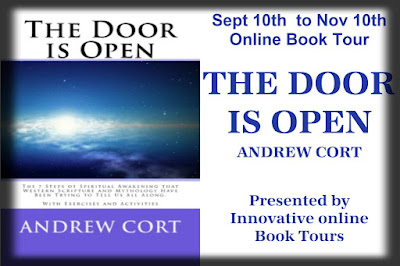Welcome to the first weekly
guest post at A Night's Dream of Books,
on the tour for The Door Is Open,
sponsored by
Innovative Online Book Tours!!
Dr. Andrew Cort
Andrew Cort
Paperback, 186 pages
CreateSpace
May 19, 2012
Genre: Religion, Mythology, Spirituality
This is the first of several weekly guest posts by Dr. Cort, who is an authority on religion and spirituality, as well as mythology, politics, history, science, education, and healing. He has written several books on these topics. His most recent one, The Door Is Open, deals with the fascinating topic of the steps to spiritual awakening, as presented in world scriptures and mythologies. Please join me in welcoming Dr. Cort to A NIGHT'S DREAM OF BOOKS!
The topic of this first post is an absolutely fascinating, as well as vitally important, one. Enjoy!
WHERE EXACTLY IS
THE KINGDOM OF HEAVEN?
Perhaps the most famous of all of Christ’s quotations, as well as one of the most disregarded, is found in Luke:
Once Jesus was asked by the Pharisees when the kingdom of God was coming, and he answered, “The kingdom of God is not coming with things that can be observed; nor will they say, ‘Look, here it is!’ or ‘There it is!’ For, in fact, the kingdom of God is within you.” (Luke.17.20-21)
We, however, are held in thrall by the things of this world, our attention dispersed into the world around us, and we look for heaven and God precisely where Christ tells us not to look, turning spirituality into the superficial and formalistic worship of external objects and historical events.
As our focus becomes more and more external, the lower rational mind gains strength and becomes more and more affronted by the irrationality of spiritual and religious claims. This is when the champions of atheism become increasingly vocal and adamant – not without cause!
Jesus was aware of this problem. So he presented his Teachings about the kingdom of heaven through parables in which he paints a picture of the kingdom by using images and symbols that bypass the rational mind and sink directly into higher levels of consciousness.
Here is one example:
The kingdom of heaven is like a mustard seed that a man took and sowed in his field; it is the smallest of all the seeds, but when it has grown it is the greatest of shrubs and becomes a tree, so that the birds of the heavens come and make nests in its branches. (Matt.13.31-32)
Here, the kingdom is likened to a tiny seed. It is the ‘smallest of all seeds’ because at our usual level of consciousness we give it the least importance! But if the man takes it, and plants it within (‘in his field’), it grows into a huge and magnificent tree – the symbol of enlightenment, thrusting upward through the levels of Being, from roots in the earth to branches in heaven. The ‘birds of heaven’ that nest in its branches are the angels.
Once Jesus was asked by the Pharisees when the kingdom of God was coming, and he answered, “The kingdom of God is not coming with things that can be observed; nor will they say, ‘Look, here it is!’ or ‘There it is!’ For, in fact, the kingdom of God is within you.” (Luke.17.20-21)
We, however, are held in thrall by the things of this world, our attention dispersed into the world around us, and we look for heaven and God precisely where Christ tells us not to look, turning spirituality into the superficial and formalistic worship of external objects and historical events.
As our focus becomes more and more external, the lower rational mind gains strength and becomes more and more affronted by the irrationality of spiritual and religious claims. This is when the champions of atheism become increasingly vocal and adamant – not without cause!
Jesus was aware of this problem. So he presented his Teachings about the kingdom of heaven through parables in which he paints a picture of the kingdom by using images and symbols that bypass the rational mind and sink directly into higher levels of consciousness.
Here is one example:
The kingdom of heaven is like a mustard seed that a man took and sowed in his field; it is the smallest of all the seeds, but when it has grown it is the greatest of shrubs and becomes a tree, so that the birds of the heavens come and make nests in its branches. (Matt.13.31-32)
Here, the kingdom is likened to a tiny seed. It is the ‘smallest of all seeds’ because at our usual level of consciousness we give it the least importance! But if the man takes it, and plants it within (‘in his field’), it grows into a huge and magnificent tree – the symbol of enlightenment, thrusting upward through the levels of Being, from roots in the earth to branches in heaven. The ‘birds of heaven’ that nest in its branches are the angels.
Author Bio
Andrew Cort is an expert on the inner message of Spiritual Awakening that is always ready to be found in the wonderful stories of the Bible and Greek Mythology. To receive several FREE GIFTS from Dr. Cort (a copy of Chapter One, ‘Making the Decision’, from his new book, THE DOOR IS OPEN; a copy of his article on RECONCILING SCIENCE AND RELIGION; and a complete version of the Bible’s erotic masterpiece, SONG OF SONGS , adapted as a Poetic Dialogue to be read out loud by lovers; as well as a subscription to his SPIRITUAL GROWTH NEWSLETTER) click here http://www.andrewcort.com/Gifts . You can also learn more on his blog, Spirituality and Religion.
MORE LINKS FOR DR. CORT
Sign up for this great giveaway!!
For the entire tour schedule,
please visit the
Innovative Online Book Tours Blog,
HERE!
(Be sure to scroll down the page.)





Hello Maria and Dr. Cort - I really like and appreciate this commentary on the Gospels. I think the idea of looking at the teachings of Jesus as more of an inward thing is enlightening and important. The passage from Luke is one of my favorite from the Gospels and I agree it is all too often disregarded. I would argue however that there is much in the Gospels and that also reflect worldly thinking and that advocate worldly actions. These are very complex books!
ReplyDeleteI am not a believer in God or what most people would define as spirituality or faith. However I respect most religious beliefs. I particularly respect the ideas that are expounded in this Post as they are thoughtful and very reasoned. While I do not believe in the divine origin of these writings, I have found much that is written in the Gospels to be admirable I would use the word “Humanistic.”
Thanks for the interesting commentary!
Hey, Brian!
ReplyDeleteWhat a WONDERFUL comment!! I think it's delightful that you can appreciate and enjoy a post such as this one, especially since you yourself have no personal spiritual beliefs.
I totally agree with you that the teachings of Jesus have an inward aspect, one that those who read the Gospels don't always understand. I also agree that Dr. Cort has done a great job of shedding light on these well-known parables! I'm really looking forward to his post next week, and know that I will really enjoy reading his book!
On behalf of Dr. Cort, you're ery welcome for the wonderful commentary! And thank YOU so much for such a wonderfully supportive comment!!! : )